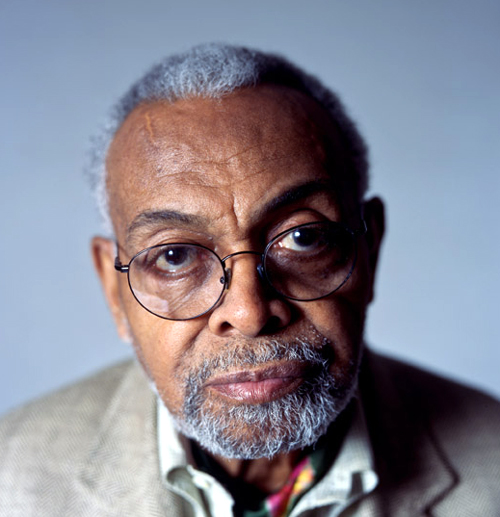One Art
BY PROF. VAROL AKMAN
Amiri Baraka
 "I went on a school trip to the Bronx Zoo when I was in about eighth grade. I really loved the elephant house. But when I asked the keeper why it smelled so bad, he said, 'I'm used to it -- I live in Harlem.'"
"I went on a school trip to the Bronx Zoo when I was in about eighth grade. I really loved the elephant house. But when I asked the keeper why it smelled so bad, he said, 'I'm used to it -- I live in Harlem.'"
Amiri Baraka was born LeRoi Jones in New Jersey in 1934. He attended Rutgers and then transferred to Howard University. In 1958, he married poet Hettie Cohen and with her began co-editing Yügen, an avant-garde magazine that introduced works by Allen Ginsberg, William Burroughs, Jack Kerouac, and other Beats. The couple also started Totem Press, which published poets such as Ginsberg, Gregory Corso, Gary Snyder, and Frank O'Hara. Jones's earliest collection of poetry, Preface to a Twenty-Volume Suicide Note, appeared in 1961. His standing as a dramatist was established with the off-Broadway staging of Dutchman in 1964.
In 1965, following the assassination of Malcolm X, Jones renounced his past life and ended his marriage. He moved to Harlem, where he founded the Black Arts Repertory Theatre. He changed his name to Amiri Baraka ('Blessed Prince') and married poet Sylvia Robinson (later known as Amina Baraka).
Baraka is famous for his harsh social criticism, striking portrayal of the anger of black Americans, and affirmation of black life. He writes in a provocative style; his method has invariably been confrontational, equivalent of a personal "shock doctrine." In a 2007 interview with James Campbell in The Guardian Baraka defended his stance: "The major poets of New Jersey have all suffered, whether it's Whitman, who lost his job for Leaves of Grass, or William Carlos Williams, who was called a communist, or Ginsberg, whose 'Howl' was prosecuted, or myself. If you practice poetry the way I think it needs to be done, you're going to put yourself in jeopardy." Baraka's defiant character caused him some trouble again when, after the 9/11, he published Somebody Blew Up America & Other Poems (2003).
Transbluesency, the selected poetry of Baraka covering the period 1961-1995, appeared in 1995. Reviewing it in Boston Review, Robert Creeley observed that Baraka "has found means to speak for that common body of others" with whom he shares experiences. He then added: "Often racist, never fair, always partial with a vengeance to his people, Baraka really is a great poet in that he tells us how it is with him and those others, and he always has and will." Other books of poetry include Black Art (1969); It's Nation Time (1970); Spirit Reach (1972); The Dead Lecturer (1964); Wise, Why's, Y's: The Griot's Song Djeli Ya (1995); and Funk Lore (1996).
Amiri Baraka's many honors include an Obie (for Dutchman), fellowships from the Guggenheim Foundation and the National Endowment for the Arts, the PEN/Faulkner Award, the Rockefeller Foundation Award for Drama, the Langston Hughes Award, and the poet laureate of New Jersey.
The following poem was written in 1958. I have particular fondness for it, for I'm also left-handed. The poem has a witty finale that you may want to find out on the web. Finally, Hettie Jones has a website http://sites.google.com/site/hettiejones where a remarkable poem, "Lament for a Turkish Suicide Age 22," is available.
For Hettie
My wife is left-handed,
which implies a fierce de-
termination. A complete other
worldliness. IT'S WEIRD BABY
The way some folks
are always trying to be different.
A sin & a shame.
But then, she's been a bohemian
all her life… black stockings,
refusing to take orders. I sit
patiently, trying to tell her
what's right. TAKE THAT DAMM
PENCIL OUTTA THAT HAND.
YOU'RE
RITING BACKWARDS. & such. But
to no avail. & it shows
in her work. Left-handed coffee,
...